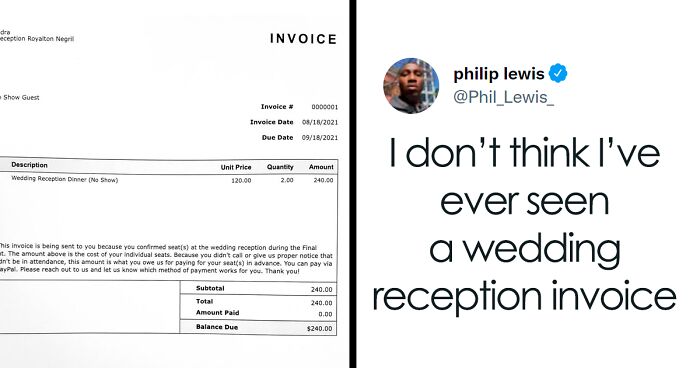
Person Gets A $240 Invoice From A Couple For Doing A “No-Show” At Their Wedding, It Sparks A Debate Online
In 2018, the average wedding typically set couples and their family members back about $44,000, according to the Brides American Wedding Study, which surveyed more than 800 brides and spouses-to-be.
The study also discovered that most weddings had less than 200 guests, with an average of 167.
And even though most of the people who confirm their attendance usually show up, some don’t.
According to HuffPost writer Philip Lewis, one couple recently came up with an unorthodox plan to address all the no-shows for their wedding reception.
Image credits: Phil_Lewis_
In order to get a better understanding of why a couple might send their no-shows an invoice, we contacted Michelle Lew, the owner of Lavender Crown Events, a wedding planning company servicing San Jose, Silicon Valley, and the surrounding areas.
Firstly, let’s talk about guest lists. Lew told Bored Panda that they are usually determined by three categories: (1) family, (2) friends, (3) coworkers. “Even more, each category is often divided into rankings of A, B, and C lists,” Lew added. “A list guests are must-haves — parents, close aunts, uncles, cousins, and best friends — the people that are the most influential in the couple’s lives. B lists are often those that may be offended if not given an invitation, such as extended family or that one close friend from college you only text a few times a year. C list guests are more for coworkers you don’t know very well or perhaps a parent’s friend that you haven’t seen since you were a child. Ranking these lists also helps with reducing guest counts for those looking for a more intimate wedding or a venue with limited capacity.”
Usually, Michelle Lew said, no-show guests are part of the C-list group who RSVP’ed but weren’t close enough to the couple to actually mark their calendars. She said it’s rare but it does happen. “Oftentimes, no-show guests with no advance notice are usually only one or two persons per hundred guests. In most cases, as the date arrives, caterers and venues will need the final guest count a week in advance. There are always emergencies that can cause a no-show after the one-week date, like an illness or medical emergency. However, it’s common for the non-attending guest to at least let the couple know!” Lew explained.
Not all types of weddings have the same amount of no-shows. For example, if someone is throwing theirs abroad, people may feel more inclined to plan their trip diligently. As Lisa Burton, aka The Bridal Consultant, plans destination weddings, she’s happy that when guests accept an invite, they mostly turn up. And if they don’t, it’s usually due to a ‘fall out.’
“‘Surprise’ guests are often more of a problem for our couples, those guests who show up abroad a few days before the wedding for dramatic effect, and although the reasoning is often quite lovely, it can be a huge hassle for the couple, considering last-minute food/drink orders, table plans, and transport,” Burton told Bored Panda.
“I’ve had a few couples that have found this incredibly stressful to arrange when they should be relaxing and preparing for their big day.”
The internet is having mixed opinions about this. Some are laughing at the document
Image credits: Va2021J
Image credits: samirah401
Image credits: MattyG58
Image credits: FredTJoseph
Image credits: LeonasLoveQuest
Image credits: chariel1986
Image credits: taylorisland715
Interestingly, the before-mentioned study found that in 2018, just 27 percent of couples said they’d fully paid for their wedding, while 42 percent handed off that responsibility to their parents. Overall, just 58 percent of those surveyed contributed to their own nuptials.
So even though weddings (before the pandemic) were getting more expensive on average, the couples seemed to no longer be able or willing to pay for themselves. All the more reason for the guests to notify them if they’re not coming; I’m not saying the no-shows deserve an invoice. Just that a little empathy from both sides would go a long way.
“While no-show guests can be annoying — especially after so much money has been paid per seat — an empty seat is usually the least of the couple’s concerns,” Michelle Lew said. “While some money is lost, there are worse situations that could happen! Most couples understand that last-minute priorities can change, especially for guests that aren’t close to the bride or groom. They will still have their immediate family and best friends with them.”
The wedding planner reminded that should a person or two no-show, the same amount of food and drinks will still be available so that someone else can get an extra serving. “If the couple is upset about the no-show, it’s always best to remind them of all the rest of the guests who are present and all the parts of the wedding going right!” Lew said.
While others are defending the couple, saying the guest are in the wrong
Image credits: ABC7Jory
Image credits: _ayeeDEEjayy
Image credits: PaigeChristieUK
Image credits: OrangeFreddyG
Image credits: robinwannabefly
Image credits: Daniellesssssss
Image credits: jackiebarbosa
Image credits: KayReneeESQ
Image credits: Liamarie_life
Image credits: Chriswb71
Image credits: TheMongo
Why can't two people be in the wrong? If you can't make it to a wedding dinner, you RSVP, if you don't - you suck. They were willing to spend a lot fo money for you to be there and you don't show up, with no warning? Screw you. At the same time, sending a bill to no-show is also petty and childish. If you have a problem, talk to them about it. Get the apology you deserve. If you pull this petty bullshit, you deserve nothing. I don't get why it always has to be one person's totally in the wrong and one person's totally in the right. Screw 'em both.
You are totally in the right on this. Unless I change my mind, then you're totally in the wrong. But so far, so good.
Load More Replies...Weddings so often degenerate into a vulgar, even narcissistic, display of conspicuous consumption, and for most people they are pretty boring. Close friends and family affairs are best, and save the cash for something interesting.
I agree with you.... Narcissistic and boring, there's no chance I would ever have a wedding ceremony/reception unless my SO wanted to organize it LOL
Load More Replies...As much as they have a point, this is incredibly petty and shows the married couple have little class.
Weddings are about personal relationships. People throwing weddings like these essentially abuse those relationships to force people to come with large gifts. RSVP'ing not to come is not done, spending money you don't have is not done. If you want to have a big wedding, pay for it yourself and accept guests are there to celebrate the new marriage. They are not there to reimburse you for it. And if you live by that rule, then it all of a sudden doesn't matter if people don't show. I for one would care more about why my guests aren't there and worry. But then I don't feel like throwing money away like that is ok in any way and feel that people showing off like that are asswhipes to begin with.
Load More Replies...Maybe I'm missing something but I don't get why the invoice is even needed... If the couple showed up were they expected to pay the $120 for the food? No. So if the food goes into my stomach, someone else, or the garbage why does it matter? You already paid. Yes it's rude to not show but it's not like they were charged an additional $120 by the caterer for having an empty seat. The only acceptable excuse would be that everyone who attended paid $120 but these people didn't show up to chip in their portion when they agreed to.
Ok, try this scenario. You work in a small office, and you are heading out to get lunch, and you say "I'm stopping at the ice-cream shop down the road, anybody want a cone? My treat!" 3 Co-workers say "yeah, grab me one!". You come back and one of them wandered off for a walk (and didn't tell anyone), and their cone melted by the time they got back. -- Sure you would be petty to say "pay me for the damn cone you wasted you jerk", but you would be justified for wanting to do that.
Load More Replies...Why can't a wedding be a party with the people you love? Why does it have to be some corporate business s**t?
Sorry if I'm being aggresive.I defend myself and what I believe is correct very..well...I don't know how to word it..obviously you know.HELP ME FOND THE DANG WORDS
Load More Replies...Would they have billed them if they had attended, or if they hadn't given a certain price gift? This is pathetic, you don't charge your guests for your wedding, it's your wedding and you pay for it, gifts are a bonus. It is impolite to just no-show, but I'm guessing there was a decent reason!
It’s already just so lame that couples invite so many people to their wedding. Everyone doesn’t need to see you gushing love, to me it’s too intimate to have all those people just gawking. It’s bizarre that everyone accepts that as the norm. But even more lame and bizarre that they do this even when they realistically can’t afford it. If $240 is a lot to you then you shouldn’t be buying something that costs $240 in heavy quantities to begin with.
So would it have been better if it HAD been a hospital emergency level of no-show? Sirens screaming past on the day of the wedding isnt going to save the couple any money. I know that when I was recently hospitalised, the last thing going through my mind was checking my diary and sorting cancellations - I was waiting for the IV pain meds to kick in. Would I have appreciated getting an INVOICE instead of a CONVERSATION regarding my no-show? Hell no, because I'm an adult who expects to interact with other adults.
"We spent $240 on you guys. Cough it up!" "Fine. We'll meet you in small claims court." I wish Judge Judy was around to chew them out. Bridezilla and groom are not only tacky but incredibly stupid. These people likely spent a sizable fortune on their wedding, money that could well have been used for a down payment on a house or otherwise invested. Money spent on a one-day bash is money will never be seen again. When I got married, we rented a community building at a local park. A local restaurant catered the reception. My dress cost $100. My mother made the cake (3-tier cherry and almond), the bouquet, corsages and boutonnieres. My musician cousins brought in sound equipment and alternated as DJ. My sister was maid of honor and she wore her best dress. All in all my wedding costs, including the fees, was little over $500. Today that is about $1500. As for these people, I give them about 1-2 years before they divorce. "They spent all that money and now they're divorced!"
I honestly don't remember if everyone showed up at my wedding. Do people take attendance now? Seems like 2 meals wouldn't even be on the radar - the caterer probably plans a little extra food just in case. Regardless, if I was sent a bill for not coming to a wedding, that would end the friendship. How about a phone call from the newlyweds instead- they could ask if everything is OK and say they were missed. It would call them out if they were irresponsible but also help them find out if there was a valid reason they missed the wedding.
First, RSVP translates as reply please. It is a request to help you plan, no more. Second, it is no more legally binding than someone texting you they'll meet you for drinks on Saturday. Feelings may be hurt but that's because both parties think their time is worth more than the other. Third, the couple chose to spend $120 on a plate. They could have chosen 100 big Macs and bottled water. Either way its their choice, not their "guests". The only time anyone owes money or anything else for that is when they are charged beforehand for something like a charity dinner or told to bring something like a potluck. Any other time, the host is responsible for all costs and to stay within their budget. Lastly, they requested their presence to witness a civic contract. The standard rate in my state for a witness is $50. If they wish to claim that RSVP was a legally binding document for their attendance, the couple now owes every other "guest" the $50 standard fee.
What kind of food were they ordering that wa 120 a plate? Sounds like an overly expensive wedding they couldn't afford themselves. You shouldn't expect others to pick up the bill to your wedding. Life happens, you can't expect everyone to show up, even with an RSVP. Though he should have at least said something if given the chance. Both parties are assholes, but the bride and groom are the bigger ones and should have stayed within a budget.
My best boss/mentor passed along a great piece of wisdom when assessing disputes like this: "Sometimes, both parties are assholes". She was a great boss.
Elaborate weddings are a waste of money. Go put a down payment on a house.
By sending an invitation you are offering to act as HOST. That doesn't involve money. ...///... Frankly, if I got an invoice like this, I'd tell the couple to have a nice life, then block them on all social media, block their number on my phone, and never speak to them again. ...///... What a couple of assholes. Who'd want to know them anyway?
I don't really know how weddings work in other countries and how not showing up will lead to this point, but from my point of view and how I see my wedding in the future (if I will have one) is I'll do my part by inviting people , if they come thank you and welcome if they didn't show up I don't care it is not the end of the world, money is already spent and already planned for that specific event with them or without them. I tend not escalate and complicate things, life is already complicated.
There is a lot of speculation without a key piece of information - why didn't they show up? Life throws stuff: emergencies, sickness, travel delays, the arrangements going turvy. It also has things like no phone reception and people at weddings keeping their phones off or at home. Can't fairly understand a situation with less than 20% of the information.
When they get divorced, everyone should send them an invoice in the amount of the money they gave them as a gift.
While not warning them in advance is rude especially if they have RSVP'd, if you can't afford to invite guests then don't invite them. They are doing YOU a favor by showing up at your wedding and not the other way around. Get over yourself.
There are a lot of delusional idiots out there with lots of delusional opinions. " You have an obligation to show up." Sure, sue me for not showing up. /S
If they were close friends/family, then my first instinct would be to call them and check in on them in case something bad had happened. If they weren't close friends and only invited to keep the numbers up, then why the heck did you invite them in the first place? I think people forget what weddings are supposed to be about.
The no-shows should have given notice of not going- if they were able to. It was inconsiderate not to. 1- did the no-show people ever make contact after at any time to explain what happened? If it was an emergency or whatever. 2- did the newlyweds put in the invitations anything about charging people if they agreed to come, then did a no-show w/o notice? This is a petty move, but they have a right to their feelings. I'd still apologize to the couple, but I wouldn't pay. 3- did anyone happen to show up that was not on the guest list? Like a guest of a guest, or more than a 'plus 1'. If so, then it might even out.
I've attended ONE wedding and swore it would be my last. Invitations go straight into the bin. They are narcissistic, greedy and boring. I'm happy for you and all, but I don't have any desire to shell out my hard earned cash just becuase you made a life choice that has nothing to do with me. The entitlement of the marrying couple is so sickening. Give me presents, show up at my ridiculous overblown party, pay becuase you didn't show. Gross.
I'll start attending weddings (and paying as expected) when the couple also compromise to not get a divorce in the next 5 years. If their celebration of love is so bloody expensive they need everyone to cough cash up their commitment should be just as serious
Yes. Everyone that gave you a wedding gift should get a divorce gift in return.
Load More Replies...I would just cut them out of my life. Seems less dramatic that way. It is rude to rsvp and then not show, but charging them seems a little much. Just don’t talk to them anymore and never invite them to another event.
While it's extremely tacky to RSVP and then not show (you couldn't send a simple text or phone call?), it's equally as tacky to try and invoice someone who you thought close enough to attend your wedding. The caterer generally needs a final head count 5 days before the wedding and will usually tell you to plan for 10-20% of your guests to not show. In this case, they're both in the wrong. (Also, don't plan a wedding you can't afford).
There's still a pandemic raging around the world. If you host a wedding in 2021 and don't brace youself for no-shows, you are the idiot. Perhaps the missing couple woke up with covid symptoms that day and decided not to be selfish jerks and attend the festivities. Who calls a bride on the morning of her wedding to tell her their problems?
I hate big weddings. It should be an intimate affair with only closest family and friends, not a staged spectacle. Show offs make me sick.
Both parties are beyond rude. No show at a wedding that you had said you would be attending. Rude Invoicing guests. Rude
I doubt the invoice was serious. This feels more like an "eff you" call out. Like, the couple is saying they noticed the c**p behavior, aren't impressed and aren't going to just let them pretend, and now don't view the flakey friends as worthy of even the smallest standard courtesy.
I'm thinking this was a way to send a clear and freezing cold "we are not friends anymore" Few people are good at emotional confrontations, either in person or in writing, and attempting one is rife with pitfalls set to twist you into looking like the bad person. This bill was easy and brutal and conveys that the former friends aren't worth standard social niceties anymore.
The thing is, unless you charge an attendance fee for a wedding, and by RSVPing the guests agree to that amount, there is no legal way to collect on this. There was no contract. If you plan your wedding with money that you don't have, but vaguely hope you will collect in gifts, then that is your mistake. Do you put "Gifts are mandatory and must be at least $120 p.P." on the invitation? That would be no less tacky than what they are trying to do. No-show guests are a nuisance, I agree. But sending invices? No, just no. If you cannot afford 200 guests, then don't invite that many. YOU are supposed to pay for your wedding, not your guests.
I don't thik they expected to be paid--just wanted to let the no-shows know the extent and cost of their inconsiderate behavior.
But the amount is already covered. If I show up or not. The couple pays anyway. It's rude, yes, but an invoice? Good luck with collecting.
I sympathize because they have to pay for the headcount in advance and they had to pay $240 in advance for these people who didn't show. I've been angry when I had to pay for birthday party guests who didn't show.
I am actually more shocked by how expensive those wedding are! Our (Danish) wedding amounts to a total of around 8000 USD, and maybe 65 USD per person for food and drinks, and we have not even chosen the cheapest options. And I don't think it is typical for parents to pay in our country, usually the couples do it themselves.
Sending an invoice is a tad tacky in my opinion, however I don't disagree in collecting the funds since mant people/couples made a lot effort, time, and spend so much in monetary to gather a reception. Whilst in this particular case the dinner table is very cheap for a wedding reception, it does not mean they don't deserve the respect of at least a heads up or some form of communication from their guests that can attend even though they've RSVP'd. I find this group is just rudely and I'll-mannered people, poor treatments and solutions from both parties.
You can invoice me 2.5 million, doesn't mean I'm paying it 😂😂 it shouldn't be a surprise that asshole couples getting married have asshole friends.
that marriage will definitely stand the test of time..... said no one ever.
I partially get where they are coming from. We had a backyard wedding on the 4th of July, and sent out invitations months in advance considering it was a holiday. We had a lot of people not show up. One didnt come because a friend was coming in to "town" from 30 miles away and wanted to attend a bbq with them instead. I only took it personal because everyone that didnt show up is the ones that my wife invited, and I felt bad for her and she didnt let us know until the morning of. I didnt send out invoices but was highly annoyed that I had spent money on food based on the amount of people who RSVP'ed. At the end of it, those who were meant to be there were and those are the same people we still have a great relationship with. Not because the others didnt go to the wedding but that is just how it turned out. The day was about me and her and we still had an amazing day. The others missed out on some amazing food.
So here's the thing we are getting married in December and I LOVE my venue. So far we have told the venue 75 people HOWEVER, they said if we need to add more we can but have to do so by Oct. IF not all show up, they will reimburse ME for not having that many guests. But regardless, if they RSVP we will pay for their spot. If they don't show, I'm not gonna bill them, they'll get a strongly worded text and it'll be done and I'll probably eat their food because I'm the bride and I'll probably be starving lol. That being said, if you RSVP show up (unless emergency) if you DON'T RSVP and show up don't expect to be fed. that simple
Why can't two people be in the wrong? If you can't make it to a wedding dinner, you RSVP, if you don't - you suck. They were willing to spend a lot fo money for you to be there and you don't show up, with no warning? Screw you. At the same time, sending a bill to no-show is also petty and childish. If you have a problem, talk to them about it. Get the apology you deserve. If you pull this petty bullshit, you deserve nothing. I don't get why it always has to be one person's totally in the wrong and one person's totally in the right. Screw 'em both.
You are totally in the right on this. Unless I change my mind, then you're totally in the wrong. But so far, so good.
Load More Replies...Weddings so often degenerate into a vulgar, even narcissistic, display of conspicuous consumption, and for most people they are pretty boring. Close friends and family affairs are best, and save the cash for something interesting.
I agree with you.... Narcissistic and boring, there's no chance I would ever have a wedding ceremony/reception unless my SO wanted to organize it LOL
Load More Replies...As much as they have a point, this is incredibly petty and shows the married couple have little class.
Weddings are about personal relationships. People throwing weddings like these essentially abuse those relationships to force people to come with large gifts. RSVP'ing not to come is not done, spending money you don't have is not done. If you want to have a big wedding, pay for it yourself and accept guests are there to celebrate the new marriage. They are not there to reimburse you for it. And if you live by that rule, then it all of a sudden doesn't matter if people don't show. I for one would care more about why my guests aren't there and worry. But then I don't feel like throwing money away like that is ok in any way and feel that people showing off like that are asswhipes to begin with.
Load More Replies...Maybe I'm missing something but I don't get why the invoice is even needed... If the couple showed up were they expected to pay the $120 for the food? No. So if the food goes into my stomach, someone else, or the garbage why does it matter? You already paid. Yes it's rude to not show but it's not like they were charged an additional $120 by the caterer for having an empty seat. The only acceptable excuse would be that everyone who attended paid $120 but these people didn't show up to chip in their portion when they agreed to.
Ok, try this scenario. You work in a small office, and you are heading out to get lunch, and you say "I'm stopping at the ice-cream shop down the road, anybody want a cone? My treat!" 3 Co-workers say "yeah, grab me one!". You come back and one of them wandered off for a walk (and didn't tell anyone), and their cone melted by the time they got back. -- Sure you would be petty to say "pay me for the damn cone you wasted you jerk", but you would be justified for wanting to do that.
Load More Replies...Why can't a wedding be a party with the people you love? Why does it have to be some corporate business s**t?
Sorry if I'm being aggresive.I defend myself and what I believe is correct very..well...I don't know how to word it..obviously you know.HELP ME FOND THE DANG WORDS
Load More Replies...Would they have billed them if they had attended, or if they hadn't given a certain price gift? This is pathetic, you don't charge your guests for your wedding, it's your wedding and you pay for it, gifts are a bonus. It is impolite to just no-show, but I'm guessing there was a decent reason!
It’s already just so lame that couples invite so many people to their wedding. Everyone doesn’t need to see you gushing love, to me it’s too intimate to have all those people just gawking. It’s bizarre that everyone accepts that as the norm. But even more lame and bizarre that they do this even when they realistically can’t afford it. If $240 is a lot to you then you shouldn’t be buying something that costs $240 in heavy quantities to begin with.
So would it have been better if it HAD been a hospital emergency level of no-show? Sirens screaming past on the day of the wedding isnt going to save the couple any money. I know that when I was recently hospitalised, the last thing going through my mind was checking my diary and sorting cancellations - I was waiting for the IV pain meds to kick in. Would I have appreciated getting an INVOICE instead of a CONVERSATION regarding my no-show? Hell no, because I'm an adult who expects to interact with other adults.
"We spent $240 on you guys. Cough it up!" "Fine. We'll meet you in small claims court." I wish Judge Judy was around to chew them out. Bridezilla and groom are not only tacky but incredibly stupid. These people likely spent a sizable fortune on their wedding, money that could well have been used for a down payment on a house or otherwise invested. Money spent on a one-day bash is money will never be seen again. When I got married, we rented a community building at a local park. A local restaurant catered the reception. My dress cost $100. My mother made the cake (3-tier cherry and almond), the bouquet, corsages and boutonnieres. My musician cousins brought in sound equipment and alternated as DJ. My sister was maid of honor and she wore her best dress. All in all my wedding costs, including the fees, was little over $500. Today that is about $1500. As for these people, I give them about 1-2 years before they divorce. "They spent all that money and now they're divorced!"
I honestly don't remember if everyone showed up at my wedding. Do people take attendance now? Seems like 2 meals wouldn't even be on the radar - the caterer probably plans a little extra food just in case. Regardless, if I was sent a bill for not coming to a wedding, that would end the friendship. How about a phone call from the newlyweds instead- they could ask if everything is OK and say they were missed. It would call them out if they were irresponsible but also help them find out if there was a valid reason they missed the wedding.
First, RSVP translates as reply please. It is a request to help you plan, no more. Second, it is no more legally binding than someone texting you they'll meet you for drinks on Saturday. Feelings may be hurt but that's because both parties think their time is worth more than the other. Third, the couple chose to spend $120 on a plate. They could have chosen 100 big Macs and bottled water. Either way its their choice, not their "guests". The only time anyone owes money or anything else for that is when they are charged beforehand for something like a charity dinner or told to bring something like a potluck. Any other time, the host is responsible for all costs and to stay within their budget. Lastly, they requested their presence to witness a civic contract. The standard rate in my state for a witness is $50. If they wish to claim that RSVP was a legally binding document for their attendance, the couple now owes every other "guest" the $50 standard fee.
What kind of food were they ordering that wa 120 a plate? Sounds like an overly expensive wedding they couldn't afford themselves. You shouldn't expect others to pick up the bill to your wedding. Life happens, you can't expect everyone to show up, even with an RSVP. Though he should have at least said something if given the chance. Both parties are assholes, but the bride and groom are the bigger ones and should have stayed within a budget.
My best boss/mentor passed along a great piece of wisdom when assessing disputes like this: "Sometimes, both parties are assholes". She was a great boss.
Elaborate weddings are a waste of money. Go put a down payment on a house.
By sending an invitation you are offering to act as HOST. That doesn't involve money. ...///... Frankly, if I got an invoice like this, I'd tell the couple to have a nice life, then block them on all social media, block their number on my phone, and never speak to them again. ...///... What a couple of assholes. Who'd want to know them anyway?
I don't really know how weddings work in other countries and how not showing up will lead to this point, but from my point of view and how I see my wedding in the future (if I will have one) is I'll do my part by inviting people , if they come thank you and welcome if they didn't show up I don't care it is not the end of the world, money is already spent and already planned for that specific event with them or without them. I tend not escalate and complicate things, life is already complicated.
There is a lot of speculation without a key piece of information - why didn't they show up? Life throws stuff: emergencies, sickness, travel delays, the arrangements going turvy. It also has things like no phone reception and people at weddings keeping their phones off or at home. Can't fairly understand a situation with less than 20% of the information.
When they get divorced, everyone should send them an invoice in the amount of the money they gave them as a gift.
While not warning them in advance is rude especially if they have RSVP'd, if you can't afford to invite guests then don't invite them. They are doing YOU a favor by showing up at your wedding and not the other way around. Get over yourself.
There are a lot of delusional idiots out there with lots of delusional opinions. " You have an obligation to show up." Sure, sue me for not showing up. /S
If they were close friends/family, then my first instinct would be to call them and check in on them in case something bad had happened. If they weren't close friends and only invited to keep the numbers up, then why the heck did you invite them in the first place? I think people forget what weddings are supposed to be about.
The no-shows should have given notice of not going- if they were able to. It was inconsiderate not to. 1- did the no-show people ever make contact after at any time to explain what happened? If it was an emergency or whatever. 2- did the newlyweds put in the invitations anything about charging people if they agreed to come, then did a no-show w/o notice? This is a petty move, but they have a right to their feelings. I'd still apologize to the couple, but I wouldn't pay. 3- did anyone happen to show up that was not on the guest list? Like a guest of a guest, or more than a 'plus 1'. If so, then it might even out.
I've attended ONE wedding and swore it would be my last. Invitations go straight into the bin. They are narcissistic, greedy and boring. I'm happy for you and all, but I don't have any desire to shell out my hard earned cash just becuase you made a life choice that has nothing to do with me. The entitlement of the marrying couple is so sickening. Give me presents, show up at my ridiculous overblown party, pay becuase you didn't show. Gross.
I'll start attending weddings (and paying as expected) when the couple also compromise to not get a divorce in the next 5 years. If their celebration of love is so bloody expensive they need everyone to cough cash up their commitment should be just as serious
Yes. Everyone that gave you a wedding gift should get a divorce gift in return.
Load More Replies...I would just cut them out of my life. Seems less dramatic that way. It is rude to rsvp and then not show, but charging them seems a little much. Just don’t talk to them anymore and never invite them to another event.
While it's extremely tacky to RSVP and then not show (you couldn't send a simple text or phone call?), it's equally as tacky to try and invoice someone who you thought close enough to attend your wedding. The caterer generally needs a final head count 5 days before the wedding and will usually tell you to plan for 10-20% of your guests to not show. In this case, they're both in the wrong. (Also, don't plan a wedding you can't afford).
There's still a pandemic raging around the world. If you host a wedding in 2021 and don't brace youself for no-shows, you are the idiot. Perhaps the missing couple woke up with covid symptoms that day and decided not to be selfish jerks and attend the festivities. Who calls a bride on the morning of her wedding to tell her their problems?
I hate big weddings. It should be an intimate affair with only closest family and friends, not a staged spectacle. Show offs make me sick.
Both parties are beyond rude. No show at a wedding that you had said you would be attending. Rude Invoicing guests. Rude
I doubt the invoice was serious. This feels more like an "eff you" call out. Like, the couple is saying they noticed the c**p behavior, aren't impressed and aren't going to just let them pretend, and now don't view the flakey friends as worthy of even the smallest standard courtesy.
I'm thinking this was a way to send a clear and freezing cold "we are not friends anymore" Few people are good at emotional confrontations, either in person or in writing, and attempting one is rife with pitfalls set to twist you into looking like the bad person. This bill was easy and brutal and conveys that the former friends aren't worth standard social niceties anymore.
The thing is, unless you charge an attendance fee for a wedding, and by RSVPing the guests agree to that amount, there is no legal way to collect on this. There was no contract. If you plan your wedding with money that you don't have, but vaguely hope you will collect in gifts, then that is your mistake. Do you put "Gifts are mandatory and must be at least $120 p.P." on the invitation? That would be no less tacky than what they are trying to do. No-show guests are a nuisance, I agree. But sending invices? No, just no. If you cannot afford 200 guests, then don't invite that many. YOU are supposed to pay for your wedding, not your guests.
I don't thik they expected to be paid--just wanted to let the no-shows know the extent and cost of their inconsiderate behavior.
But the amount is already covered. If I show up or not. The couple pays anyway. It's rude, yes, but an invoice? Good luck with collecting.
I sympathize because they have to pay for the headcount in advance and they had to pay $240 in advance for these people who didn't show. I've been angry when I had to pay for birthday party guests who didn't show.
I am actually more shocked by how expensive those wedding are! Our (Danish) wedding amounts to a total of around 8000 USD, and maybe 65 USD per person for food and drinks, and we have not even chosen the cheapest options. And I don't think it is typical for parents to pay in our country, usually the couples do it themselves.
Sending an invoice is a tad tacky in my opinion, however I don't disagree in collecting the funds since mant people/couples made a lot effort, time, and spend so much in monetary to gather a reception. Whilst in this particular case the dinner table is very cheap for a wedding reception, it does not mean they don't deserve the respect of at least a heads up or some form of communication from their guests that can attend even though they've RSVP'd. I find this group is just rudely and I'll-mannered people, poor treatments and solutions from both parties.
You can invoice me 2.5 million, doesn't mean I'm paying it 😂😂 it shouldn't be a surprise that asshole couples getting married have asshole friends.
that marriage will definitely stand the test of time..... said no one ever.
I partially get where they are coming from. We had a backyard wedding on the 4th of July, and sent out invitations months in advance considering it was a holiday. We had a lot of people not show up. One didnt come because a friend was coming in to "town" from 30 miles away and wanted to attend a bbq with them instead. I only took it personal because everyone that didnt show up is the ones that my wife invited, and I felt bad for her and she didnt let us know until the morning of. I didnt send out invoices but was highly annoyed that I had spent money on food based on the amount of people who RSVP'ed. At the end of it, those who were meant to be there were and those are the same people we still have a great relationship with. Not because the others didnt go to the wedding but that is just how it turned out. The day was about me and her and we still had an amazing day. The others missed out on some amazing food.
So here's the thing we are getting married in December and I LOVE my venue. So far we have told the venue 75 people HOWEVER, they said if we need to add more we can but have to do so by Oct. IF not all show up, they will reimburse ME for not having that many guests. But regardless, if they RSVP we will pay for their spot. If they don't show, I'm not gonna bill them, they'll get a strongly worded text and it'll be done and I'll probably eat their food because I'm the bride and I'll probably be starving lol. That being said, if you RSVP show up (unless emergency) if you DON'T RSVP and show up don't expect to be fed. that simple

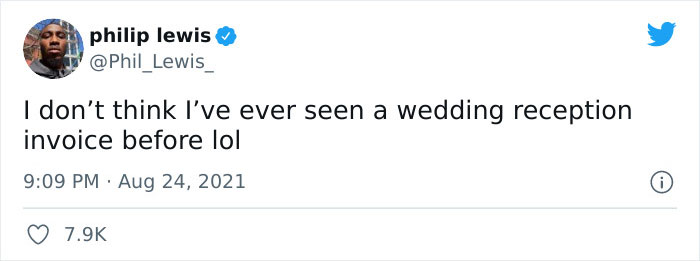
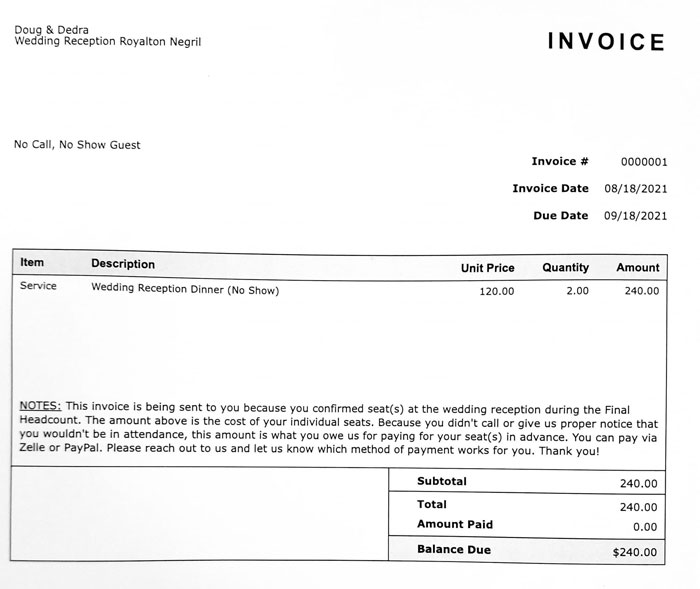
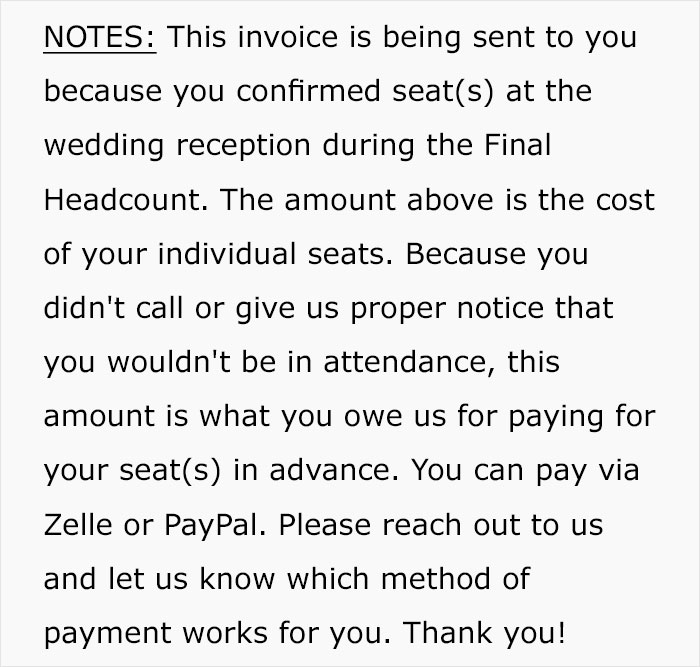
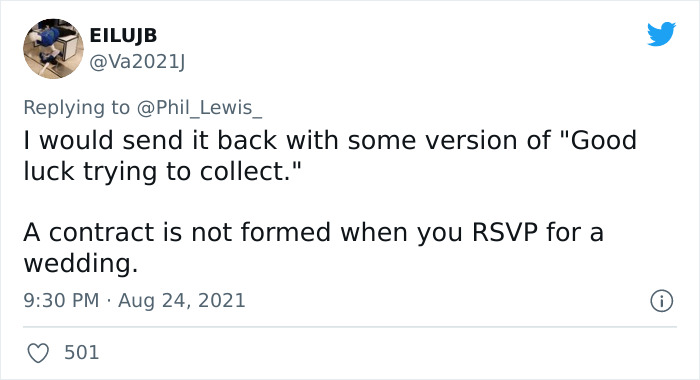
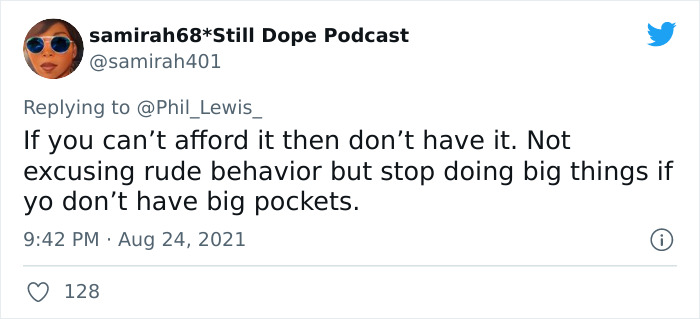
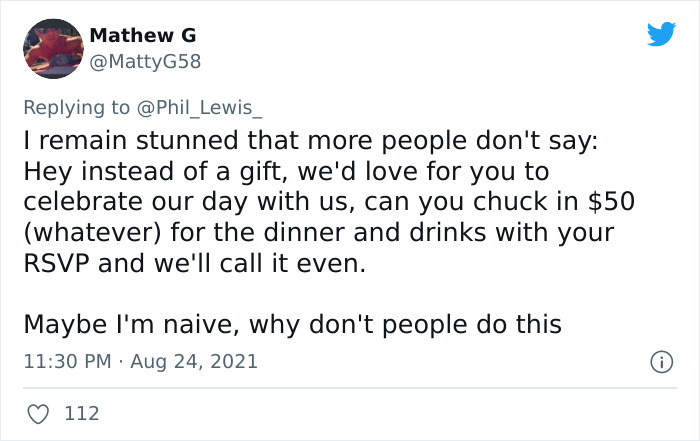

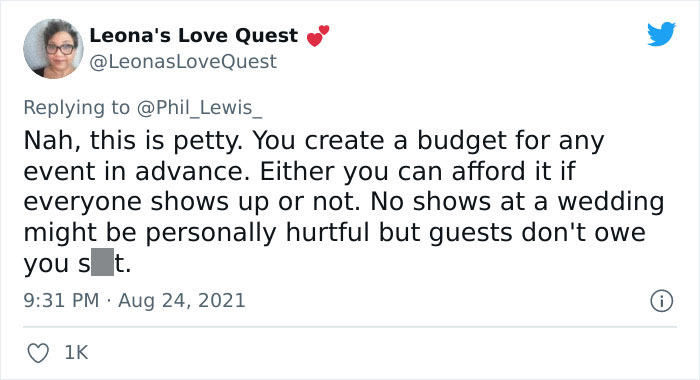
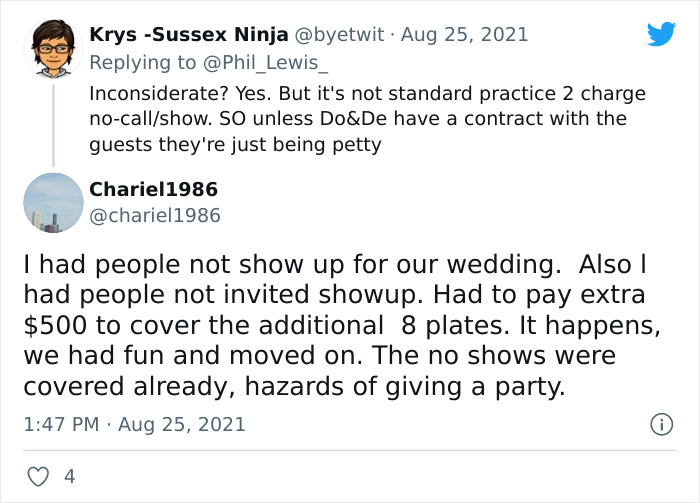
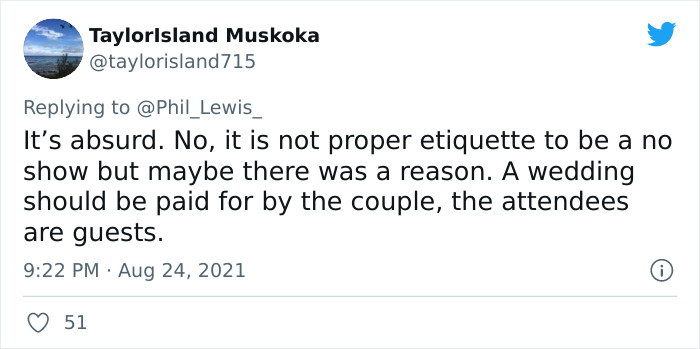
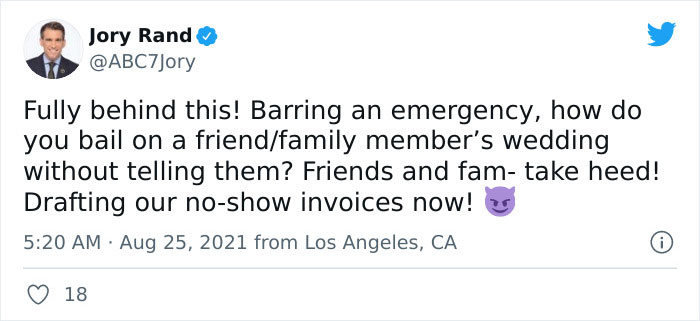
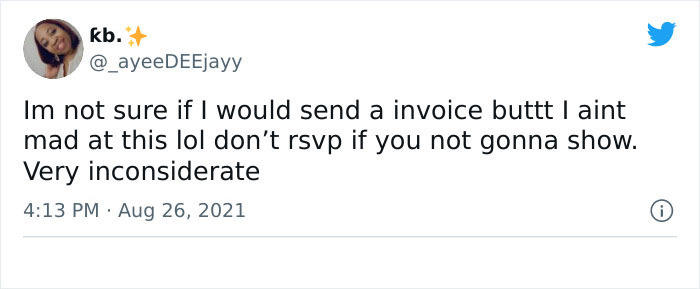




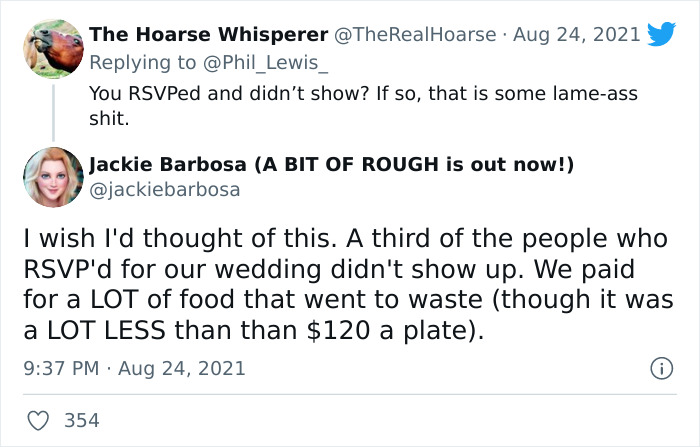

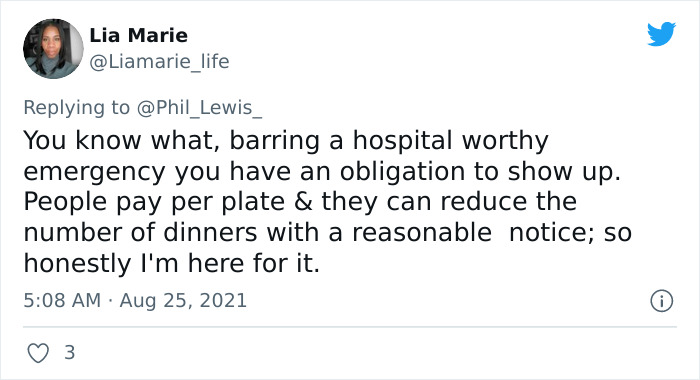
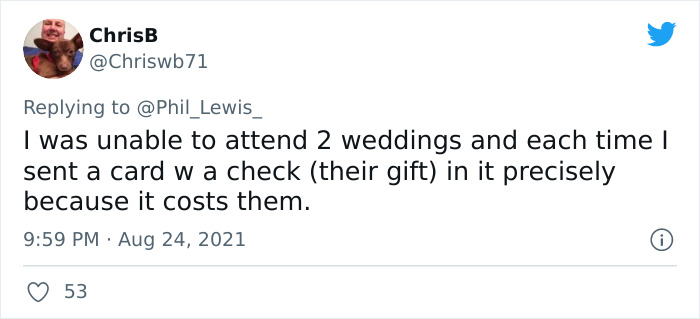
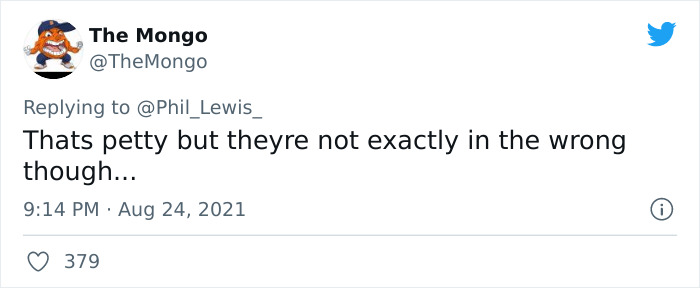




75
97